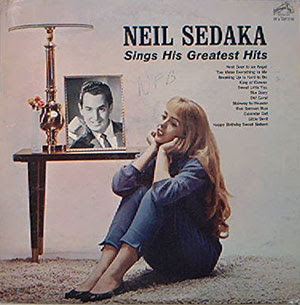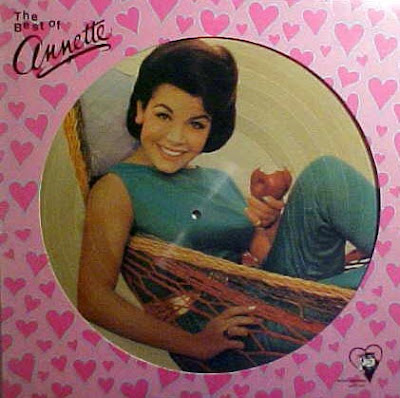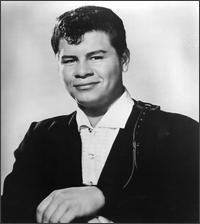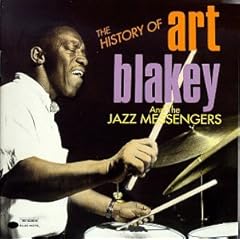
Neil Sedaka gets no respect. In terms of 50s schlock meisters, Paul Anka gets better notices. I kind of get it.
Sedaka was like that guy in your class, every class has one, the guy who could play piano like nobody’s business, who got to work on all the school plays providing musical accompaniment. And he was a sucky kid. You know the type I mean. Gifted with talent, deprived of coolness.
Ok, I’m being a bit unfair. But just a bit. Because what Sedaka was missing was cool. He was handsome, he was an amazing songwriter and he put together amazing records with astounding vocal pyrotechnics and harmonies. But there was always something just a bit too chirpy about him, a bit too happy, a bit too high school.
Not everything he did was great. He had a great run of hits starting in 1959, and running through the early 60s. By about ’63 his style was starting to droop, and in 1966 The Answer To My Prayer was the last top 100 single he would have for 9 years. (If you count top 40 singles, go back to 1963.) Then in 1975 he had a comeback that put 2 singles at number 1, and reminded the world that Neil Sedaka was still a force to be reckoned with. But he couldn’t maintain it, and anyway, though he still had some musical smarts, the uniqueness of the old hits like Breakin’ Up Is Hard To Do and Next Door To An Angel was a thing of the past.
Altogether Sedaka had 29 hits on the top 100. For this collection I took
Oh Carol! And Other Hits, an RCA Camden reissue, and original old scratched copy of
Neil Sedaka Sings His Greatest Hits, which I picked up at the Salvation Army store, a collection of his 70s hits which I got at Pyramid, and a semi-random collection of obscure 60 hits, and 70s studio albums that I used to hand-pick songs from the appropriate era. I didn’t do a bad job, 24 of his 29 hits.
Neil Sedaka:
•
Next Door To An Angel – The story is way over the top. His skinny pre-pubescent next door neighbour has grown up into an “angel.” He obviously doesn’t have much contact with his neighbours. And she is 16, I’d say they haven’t spoken for, what, 4 years? Now he thinks she’ll be interested. And how old is he, anyway? Ok, but if those doobe-bop-be-doo-bop-she-down-downs don’t melt her heart then she’s made of ice. Neil Sedaka was king of not-cool-enough-to-be-scatting nonsense syllables, and I’m sold. This was a top 10 hit in the fall of 1962.
•
King Of Clowns – Tears Of A Clown / Tracks Of My Tears / Two Faces Have I / The Great Pretender / etc. Neil Sedaka style. Neil gives a martial rhythm, as the show goes on. From the spring of 1962.
•
Stairway To Heaven – No this is not the Led Zeppelin song. And while we are at it, it is not the O’Jays song either. But it’s typically jubilant Sedaka, I’ll build a stairway to heaven, because heaven is where you are. Is she dead? Doesn’t sound like it. Must me that angel who lives next door. Top 10 in the spring of 1960.
•
Run Sampson Run – Ticka ticka ticka snare, then banjo, then Neil regales us of a story that took place “1000 years B.C.” Shame on him. BC indeed. Never mind. This is the biblical tale from the book of Judges, but hey, Tom Jones swept the floor with Sedaka’s version of the story. That, though, is from an entirely different universe. From the fall of 1960. The A side was You Mean Everything To Me.
•
Sweet Little You – Neil uses doo wop affectations, crazy falsetto, and a killer piano solo to proclaim his undying love. From the fall of 1961.
• You Mean Everything To Me – So here he is doing a ballad, and he throws in the female chorus up front and centre, the strings, the everything that she means to him. From the fall of 1960.
•
Oh! Carol – A good natured teasing song written for Carole King (note spelling) who was a

young song writer then, working in the Brill Building with Neil and her husband Gerry Goffin. There doesn’t seem to have been any reality to the feelings expressed here, but all’s fair in songwriting. And it is superb pop, His first top 10 hit, from the winter of ’59 / ’60.
•
Little Devil – One of Neil’s poppiest songs, the tune and arrangement and delivery totally take the sting out of the lyrics. A common theme (Devil In Disguise, Devil In Her Heart). From the summer of 1961.
•
Circulate – Advice to the lovelorn. Jazzy. Plenty of fish in the deep blue sea, he says, out shopping for a mate. It’s always so easy in pop music, isn’t it?
•
All The Way – We are talking here about emotional stuff. Of course we are, this is a respectable pop song after all. Sinatra did this.
•
Breaking Up Is Hard To Do – It is, breaking up is hard to do. Truer words were never spoken. Breaking up can kill you, or you think it can. You survive though, damaged a bit, but stronger. Don’t say that this is the end, he says. This may be the happiest sounding song about breaking up there is, but there is truth in it for all that, and it loses nothing for all the fantastic vocal pyrotechnics and harmonies. One of my favourites. A hit also for The Happenings and for The Partridge Family, and for Sedaka himself in a vastly rearranged version about a decade and a half later. The original is still the best. From the summer of 1962.
•
Calendar Girl – This is cute, dumb but cute. From the winter of 1961. Yeahya yeahya, my heart’s in a whirl…
•
Smile – This is the Charlie Chaplin. He does it pretty straight. There are probably a billion versions out there.
•
Everything Happens To Me – I’ve mortgaged all my castles in the air says Neil in this nightclub-worthy song about a poor no-luck sap. In the end it’s just another failed love song.
•
Sunny – Not the Bobby Hebb song. Cheerful as its title would imply. From the summer of ’64.
•
One Way Ticket To The Blues – A train song, Johnny Cash would be proud. In truth, it’s a bit dumb (choo choo train chuggin’ down the track?) But I like old Neil, so I don’t mind.
•
Let’s Go Steady Again – It’s that simple, isn’t it Neil? Answer: No it isn’t. There isn’t a hope in hell she’d say yes. This is from the fall of 1963, and, in truth, the formula was getting just a bit stale.
•
I Go Ape – Neil does his best Little Richard, but it’s not his strong suit. This was only his second hit, and it didn’t quite make the top 40. Maybe that’s why he didn’t pursue this style. From the spring of 1959.
•
Look To The Rainbow – The full MOR treatment on this. On records like this Neil Sedaka positions himself as an “adult contemporary” entertainer, presumably one to be taken seriously, but his voice is too idiosyncratic for this sort of thing to work.
•
The Girl For Me – Another one of those ‘the way you do this the way you do that’ songs. I like the line about the dimples, though.
•
You’re Knockin’ Me Out – And yet another…
•
The Diary – His debut. Not the Bread song. The idea of being able to go into someone’s heart and see what’s there is all too tempting in theory; in practice it’s less than ideal. But really that’s really not what he wants, he just wants to know if she fancies him. From the winter of 1959.
•
Happy Birthday Sweet Sixteen – Sixteen is some kind of magic number. Just ask The Crests. But there is something cooking here, it’s the night, after all, that he’s waited for, because she is “not a baby anymore.” So what happens tonight, huh? He revisited the theme, more or less, on Next Door To An Angel. From the winter of 61 / 62.
•
Fallin’ – Neil wasn’t the first to play on the “falling” concept of falling in love, and he wasn’t the last. He wasn’t the best either.
•
Alice In Wonderland – Just a song about a girl named Alice, with a harp high up in the mix. From the winter of 1963. Chalk it up with Jefferson Airplane’s White Rabbit as the top 2 songs based on Lewis Carroll. (We’ll talk about Donovan later)
•
Stupid Cupid – Brilliant rhyme. This was a hit for Connie Frances.
•
I Hope He Breaks Your Heart – He wants her back, that’s the whole premise behind this tale of revenge. Not likely, though, that she’d “come running back” like he hopes. Ah well, one can always hope…
•
The Immigrant – A song inspired by, dedicated to? John Lennon, and all his trials and tribulations trying to get an American visa. Into his second career, this is from the spring of 1975.
•
Standing On The Inside – A song about a breakthrough, joining the in-crowd, realizing one’s dreams. Not sure how he did it, or what it means, but there doesn’t seem to be any irony in this, so it sounds like something’s missing.
•
Love Will Keep Us Together – Not enough, pal, not enough. But let’s not go there. Neil wrote this, and recorded it obviously, but it was a hit for The Captain & Tenille.
•
Solitaire – A hit for The Carpenters. Neil does a decent performance of this song of solitude and loneliness.
•
The Other Side Of Me – “The times we talk, we never speak” says Neil in this study of how people hide themselves. The trick is managing all those different sides of your personality, and when it gets out of balance, that’s when the trouble starts. The song is about someone uncomfortable in his own skin, not a subject that gets a lot of attention in pop music. But even here he sings “only you can set me free,” the naïve idea that love can fix everything.
•
A Little Lovin - A throwback to his earlier style, a little heavier on the production. Not The Fourmost hit.
•
Lonely Night (Angel Face) – Another Captain & Tenille hit. This is Neil trying to stay current on the cusp of the disco era. That he didn’t isn’t because of any want of effort on his part.
•
Brighton – Happy memories of a beach resort. I don’t think, though, that this is Brighton in England.
•
(I’m A Song) Sing Me – Sort of like Bruce Johnson’s I Write The Songs, the song that everyone hates. This isn’t as offensive, but that’s not saying much.
•
Breaking Up Is Hard To Do – The slow version. You’ve got to admire the ambition, the whole idea of reinventing yourself so radically. Still, I prefer the original. Top 10, this one, in the winter of 1976. The original was number 1.
•
The Dreamer – The whole idea of sleeping, dreaming, fantasizing, Neil Sedaka style, from the summer of 1963.
•
Laughter In The Rain – The signature song from phase 2 of his career, number 1 in the winter of 1975. I was in grade 12, and it didn’t send me into raptures. But hearing it now, sure he’s talented, gets it all together, piano, sax, lilting melody, but I can’t help thinking about how he lost his edge.
•
Cardboard California – This is his Hotel California. Milder, but just as heartfelt.
•
Bad Blood – Ok men it’s time to groove. The beat is irresistible, and the song went to number 1 in the fall of 1975, and I was out of the country so I didn’t hear it until later. Elton John accompanies.
•
The Queen Of 1964 – A song about a has-been groupie. Surprisingly few songs about groupies – Jim Croce did Five Short Minutes, and Paul McCartney did Famous Groupies. But this is probably the best, with all due respect to the late Jim C.
•
The Hungry Years – It’s hard for successful people to sing about not being successful, or about not being successful yet. It’s especially hard when they try to convince you that being poor and struggling is better than being rich and successful. But you know, it’s music, the feelings are genuine, I suppose.
•
Betty Grable – A tribute to a fallen star. A little silly, but not without charm.
•
Beautiful You – Standard Love song fair. I listen to this, and I try to work out something unique or something notable, and it’s difficult. Let’s just say that it’s standard love song fair, and leave it at that.
•
That’s When The Music Takes Me – A song about music, definitely better than the Bruce Johnson song. Music, and how it salvages a crappy life situation. It could be my theme song, me and a billion others. From the summer of 1975. • Our Last Song Together – A super romantic, and bogus, breakup song. But it’s nice.
•
One More Mountain To Climb – A song about overcoming adversity. I liked the hit version by Dr. Music, that was c. 1971. It’s hard to find, the Dr. Music version, being a Canadian record and all. But here is the original, from an early 70s LP. • Steppin Out – The title track of one his 70s albums that was ubiquitous in second hand shops when I was frequented then back when. The song is a sociological analysis and an invitation.
•
Love In The Shadows – A song about illicit love, at the dark end of the street, apologies to James Carr. This was a hit in the spring of 1976. For my money, it’s too slick to convey the emotion of the lyrics.
•
A Song – Well, song titles don’t get much more generic than this, and here is Neil Sedaka singing about singing, and songs like this rarely work. This is no exception.
•
Medley – Oh! Carol/ Happy Birthday, Sweet Sixteen / Star-Crossed Lovers / Hey Little Devil / Breaking Up Is Hard To Do / Calendar Girl, all spun together in a live medley. Star-Crossed Lovers is the interesting one here, a song about intermarriage, (remember that show, Brigit Meets Bernie?). It doesn’t seem to have made the top 100 at all; it may have been on Cashbox. I remember it though, strangely, late 60s, heard it once or twice. I got the meaning right away, but later figure I got it wrong, learning that “star-crossed lovers” was just a term to describe people in love. But no, I was right the first time.
•
All You Need Is The Music – Was it inevitable, that Neil Sedaka would go disco? No it was not. But it happened, though it’s doubtful that this got played at Studio 54.
•
Should’ve Never Let You Go – In a page out of the Sinatra book, Neil sings a love song duet with has daughter Dara. In a weird way, this works.
•
Polonnainse In A Flat – A live performance. This is by Chopin. Sedaka plays the classics, just to prove that he can actua
 For so long I knew Hank Ballard only by reputation. The first record I found of his was Let’s Go Let’s Go Let’s Go, and later I got The Switcheroo. In the end I settled with 4 songs (the other two were The Twist / Teardrops On Your Letter). It was only I after I got there that I found Sex Ways, The Best Of Hank Ballard & The Midnighters at the central library, and my world is just a bit more complete.
For so long I knew Hank Ballard only by reputation. The first record I found of his was Let’s Go Let’s Go Let’s Go, and later I got The Switcheroo. In the end I settled with 4 songs (the other two were The Twist / Teardrops On Your Letter). It was only I after I got there that I found Sex Ways, The Best Of Hank Ballard & The Midnighters at the central library, and my world is just a bit more complete. A Chris Barber greatest hits collection would consist of one song, though he had quite a presence in the U.K. I obtained said “collection” from The Roots Of British Rock.
A Chris Barber greatest hits collection would consist of one song, though he had quite a presence in the U.K. I obtained said “collection” from The Roots Of British Rock. I told you that I was an ignoramus when it came to jazz...
I told you that I was an ignoramus when it came to jazz... Speaking of teen idols...
Speaking of teen idols... Think of all those teen idols, Frankie Avalon, Fabian, Tab Hunter, Tommy Sands, Bobby Vee, etc. They are all male. This was not a gender neutral phenomenon.
Think of all those teen idols, Frankie Avalon, Fabian, Tab Hunter, Tommy Sands, Bobby Vee, etc. They are all male. This was not a gender neutral phenomenon. d and sun and surf and swimming, we have Bikini Beach, (keep listening) and here we have the muscle beach party, on which the emphasis is on brute strength and crassness. What kind of fascist stuff is this anyway? There was a movie like this, and Frankie Avalon did the title track, this song, and he was not, as far as I’m aware, any kind of muscle man.
d and sun and surf and swimming, we have Bikini Beach, (keep listening) and here we have the muscle beach party, on which the emphasis is on brute strength and crassness. What kind of fascist stuff is this anyway? There was a movie like this, and Frankie Avalon did the title track, this song, and he was not, as far as I’m aware, any kind of muscle man. Neil Sedaka gets no respect. In terms of 50s schlock meisters, Paul Anka gets better notices. I kind of get it.
Neil Sedaka gets no respect. In terms of 50s schlock meisters, Paul Anka gets better notices. I kind of get it. young song writer then, working in the Brill Building with Neil and her husband Gerry Goffin. There doesn’t seem to have been any reality to the feelings expressed here, but all’s fair in songwriting. And it is superb pop, His first top 10 hit, from the winter of ’59 / ’60.
young song writer then, working in the Brill Building with Neil and her husband Gerry Goffin. There doesn’t seem to have been any reality to the feelings expressed here, but all’s fair in songwriting. And it is superb pop, His first top 10 hit, from the winter of ’59 / ’60. I only have this one Bobby Bare album, called The Best Of Bobby Bare, an old classic released in the mid 60s, that I picked up on the original vinyl at Into The Music, still on Osborne in those days. He had 8 top 100 singles, including a freak hit from 1974. Have I Stayed Away Too Long was a single that made the lower reaches of the chart in the spring of 64; apart from the ’74 track it’s the only one missing.
I only have this one Bobby Bare album, called The Best Of Bobby Bare, an old classic released in the mid 60s, that I picked up on the original vinyl at Into The Music, still on Osborne in those days. He had 8 top 100 singles, including a freak hit from 1974. Have I Stayed Away Too Long was a single that made the lower reaches of the chart in the spring of 64; apart from the ’74 track it’s the only one missing. Dee Clark was a man. I say that because a number of years ago I read a book about women in rock, it was probably called Women In Rock but don’t quote me. It had an appendix, a comprehensive list of women in rock, and Dee Clark was on the list.
Dee Clark was a man. I say that because a number of years ago I read a book about women in rock, it was probably called Women In Rock but don’t quote me. It had an appendix, a comprehensive list of women in rock, and Dee Clark was on the list. I like The Crests. They emphasize the melody, the romance. They were a mixed-race group; their lead singer was Johnny Maestro who was Italian. After a few years with the group he went solo and had a few hits, and then he disappeared until 1969, when he reappeared as lead singer of Brooklyn Bridge, a kind extreme version of Gary Puckett & The Union Gap.
I like The Crests. They emphasize the melody, the romance. They were a mixed-race group; their lead singer was Johnny Maestro who was Italian. After a few years with the group he went solo and had a few hits, and then he disappeared until 1969, when he reappeared as lead singer of Brooklyn Bridge, a kind extreme version of Gary Puckett & The Union Gap. He was young, a kid. That’s the thing that everybody remarks about when Ritchie Valens comes up. Well sure he was young. My best guess is, and this is no knock, that dying with Buddy Holly made him more famous and better remembered than he would have been had he lived. By the evidence, he was a talented guitarist, and an ok songwriter. In his very short career he placed 5 songs on the top 100, and all 5 are on this collection, called Ritchie Valens’ Greatest Hits, which I picked up so long ago at Records On Wheels.
He was young, a kid. That’s the thing that everybody remarks about when Ritchie Valens comes up. Well sure he was young. My best guess is, and this is no knock, that dying with Buddy Holly made him more famous and better remembered than he would have been had he lived. By the evidence, he was a talented guitarist, and an ok songwriter. In his very short career he placed 5 songs on the top 100, and all 5 are on this collection, called Ritchie Valens’ Greatest Hits, which I picked up so long ago at Records On Wheels. Ray Anthony had a long and distinguished career as a bandleader and arranger and conductor and composer. I think his most famous song was The Bunny Hop. He put 6 songs on the top 100 between 1955 and 1962, but for all that, I just have the one song. Shame on me…
Ray Anthony had a long and distinguished career as a bandleader and arranger and conductor and composer. I think his most famous song was The Bunny Hop. He put 6 songs on the top 100 between 1955 and 1962, but for all that, I just have the one song. Shame on me… I got this off of the original album, the one that came out in 1958, which I found in all its glory at Pyramid Records.
I got this off of the original album, the one that came out in 1958, which I found in all its glory at Pyramid Records. The Chipmunks deserve a place in The Rock And Roll Hall Of Fame, surely. I’m not even sure why. Maybe it would just be an antidote to those who take it so darn seriously.
The Chipmunks deserve a place in The Rock And Roll Hall Of Fame, surely. I’m not even sure why. Maybe it would just be an antidote to those who take it so darn seriously. I ought to have a collection by Louis Prima I suppose but I don’t. No excuses either; they are available. But I did come across a collection by Louis and his then wife, Keely Smith, but for reasons best left unstated, though they have to do with finances and the lack thereof, I only downloaded one track. So it goes…
I ought to have a collection by Louis Prima I suppose but I don’t. No excuses either; they are available. But I did come across a collection by Louis and his then wife, Keely Smith, but for reasons best left unstated, though they have to do with finances and the lack thereof, I only downloaded one track. So it goes… If you like cool jazz, that’s cool. I’m thinking of Miles Davis, cool.
If you like cool jazz, that’s cool. I’m thinking of Miles Davis, cool.
